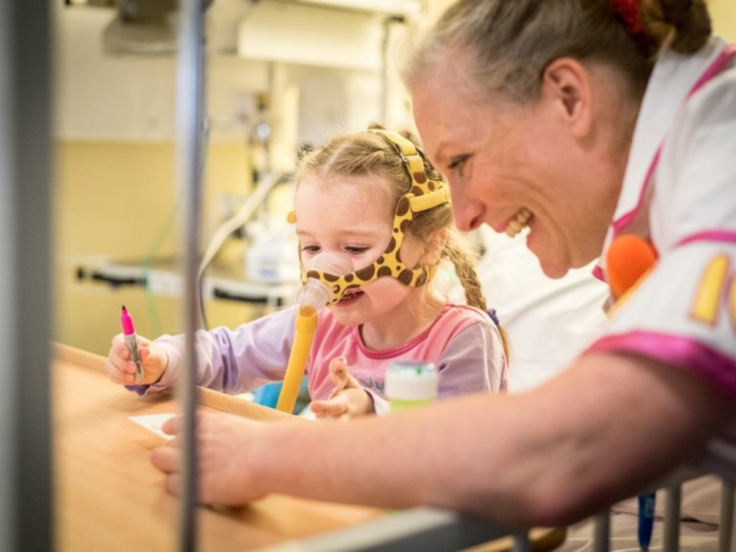7 February 2023
 Dr Ding Dong - 22 years of being a Giggle Doctor
Dr Ding Dong - 22 years of being a Giggle Doctor

Since 2001, Clare has been working as Dr Ding Dong, “I have always believed in the power of art and healing,” she says. Being a Giggle Doctor allowed her to draw on all the threads of her work in acting and drama therapy, so it immediately made sense.
“My first shift was at Evelina, which is where I was born, I remember thinking, how lovely to be starting this in the place I was born”. Those early Giggle Doctor shifts, at Evelina London Children’s Hospital, Great Ormond Street, and later St Piers School at Young Epilepsy weren’t always easy: “Some of the biggest lessons I learned were about not working with the condition or illness, but with the essence of the person. Zoning into the eyes, sound, or movement, depending on how the child communicates – that’s the way in. It was very hard at the beginning!”
The challenge was rewarded however, by some wonderful connections with the young people Dr Ding Dong met along the way: “There was one boy I used to see every week in Intensive Care at Great Ormond Street, he was maybe 1-year-old. And then he wasn’t there one week, and that’s when you don’t know whether to ask the question – Is he alive? Has he died? Has he moved? A few years later, I was visiting the Children’s Trust, and I was walking down the corridor with my bells on my ankles, when a mum heard and exclaimed: “Dr Ding Dong! It’s Dr Ding Dong!” – and there he was, this little lad with his mother. It was amazing, magic! We had such a strong connection. There were times he didn’t want to see anyone else, he just wanted to see me, and most of the time we farted with my fart machine. And he loved the colour yellow. That was a time I was very clear about the difference I made.”

The connection between Giggle Doctor and child is crucial, but the other relationships the Giggle Doctor develops with those around the child can also have a profound impact: “Our job isn’t just about the children, it’s about the staff – we make a difference to them. I remember going in after lockdown and so many people were grateful that I was there. I haven’t experienced such an outpouring in hospital before, there was a huge level of appreciation.”
“The staff love seeing children’s reactions, but I feel often the parents, families and caregivers need it desperately! And that in turn affects the child, especially the younger ones. If they see their parents/family/caregivers enjoying play with a Giggle Doctor, or even just having a conversation, there’s a sense of ease. If the parent/adult/sibling is happier and more relaxed that has a ripple effect which is crucial in the child’s healing.”

“Some parents/families/caregivers are pretty traumatised by going into hospital with their child and that doesn’t just go away when they leave the hospital, it can continue. If I’ve been part of a healing experience for them, I hope that this will stay with them and help to ease the trauma – the memories and feelings of the laughter, of the relaxedness, of the conversations, or whatever it happened to be.”
Over the past 22 years, Dr Ding Dong has learned a lot, but so has Clare: “I’ve really had to look at the nature of illness and wellness, of death and trauma. I see some of these patients every week, I build relationships with them, and then they’re gone. You’ve got to deal with that, I feel, because it isn’t going to go away without being given attention. I’ve really had to look at this – what do I believe? How do I allow the time for the grief and the loss and move through it, whilst at the same time celebrating the people I’ve had the fortune of spending time with?”
Of course, there are also heart-warming stories where parting from a child means healing, rather than grief: “I saw one long-term oncology patient every week for a long time. She would barely say a work to me, but I’d always leave her with a sticker. Her mum said, “She talks about you every week as soon as you’re gone, but when you’re here she won’t say a word.” A few years later, I ended up seeing her on the outside and she couldn’t stop talking! She had lots of hair, and she was just so vibrant and well.”
After many years in an emotionally taxing job, it might be tempting to leave the role behind, but for Clare, being Dr Ding Dong feels profoundly important: “The curiosity never stops – how I change as a person and as an artist over the years and how this informs my work in the hospital and my engagement with people. For me, the primary focus is the connection to myself and the connection to others, being present and part of the whole, of giving and receiving.”
